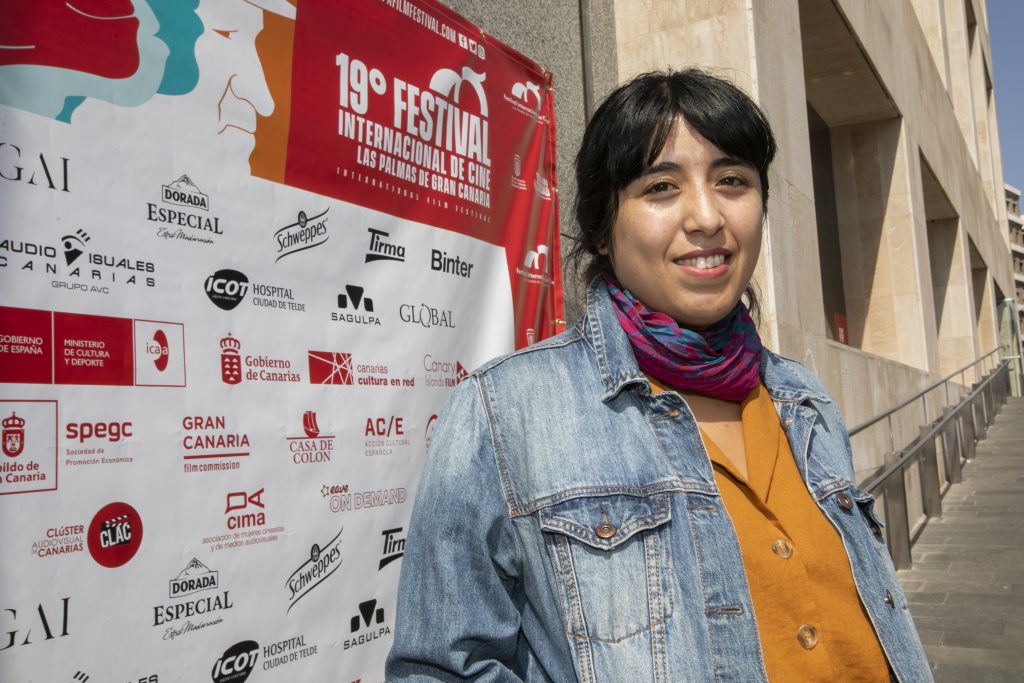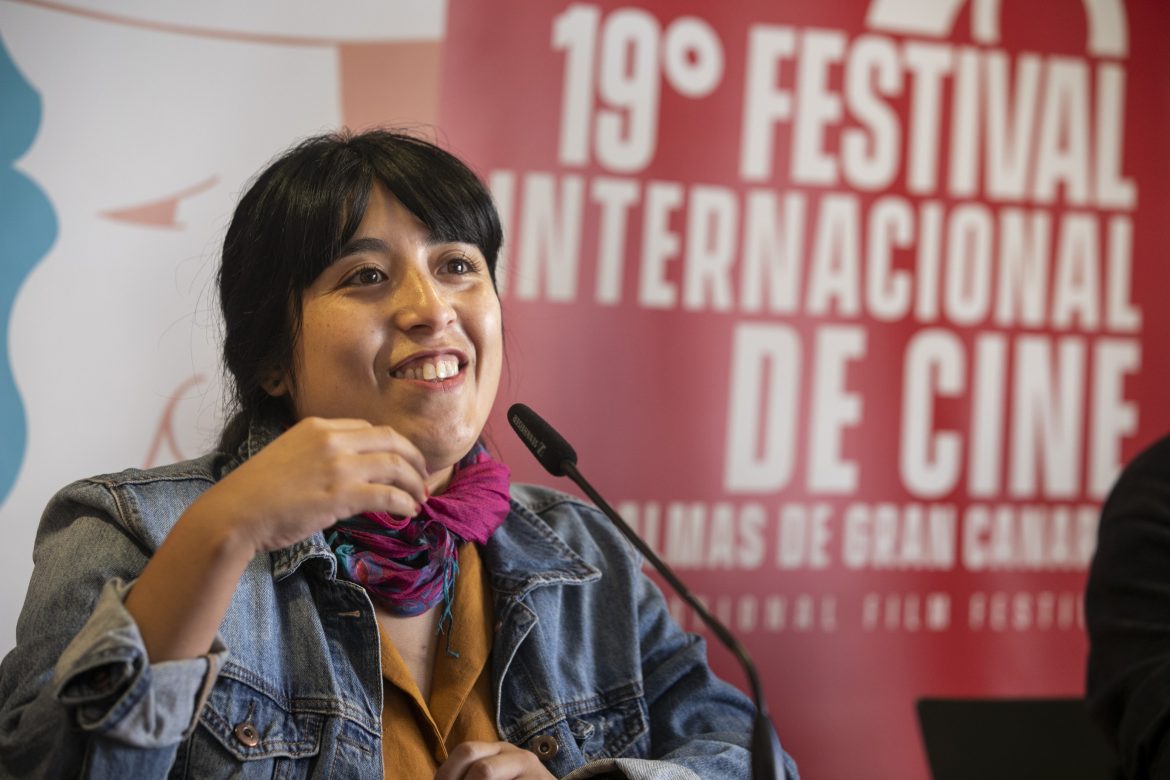The documentary by director Karin Cuyul reveals personal and collective aspects of a painful period in Chile’s recent history
The last screening of the film, which competes in the Film Festival’s Official Section, will take place tomorrow Thursday at the Monopol Multiplex at 5 pm

Las Palmas de Gran Canaria, Wednesday 27 March 2019.- Chilean director Karin Cuyul presented this Wednesday 27th Historia de mi nombre (Chile, Brazil, 2019, 78 min.), her first feature, which competes in the 19th Las Palmas de Gran Canaria International Film Festival’s Official Section. In this documentary, Cuyul seeks to reconstruct her identity from her name, whose background contains her family’s true story. It is a beautiful metaphor of cinema as a reconstruction of oneself from the observation of another, the fellow man and the external too. A journey into her own life, her own memories, her past, that reveal personal and collective aspects of a painful period in Chile’s recent history.
After loosing all her family records when her house burned down, Cuyul decided in 2012 to reconstruct her childhood memories by visiting the places where she grew up and by gathering, too, other people’s home files. She specifically investigates the figure of Karin Eitel, a young woman arrested and tortured in 1987 by Pinochet’s secret police, and whose story inspired Cuyul’s mother to name her after her.
Removed from her initial idea “due to the journey of the film’s process, script, research, shooting and later editing”, Cuyul realized that the Historia de mi nombre “became much more personal” and that she had to talk from her and her family’s history, but “always trying to address her country a little”.
In addition to the vast archive she compiled, even through a petition she made in social networks, she admitted that “reading about war traumas was very useful because in Chile there isn’t so much investigation about it”, as opposed to a lot of documents about missing people, children of political executed people, those in exile…, because “nothing happened” to her family, “they didn’t experience torture or were part of the resistance”.
In some way, the Chilean director recognized that “she war very far away from that scene”, one in which she didn’t find her place in a country that “was completely divided in two”. Thanks to those stories by post-war generations, she explained, “she was beginning to understand how silence and memory function and work”.
In Historia de mi nombre, produced, among others, by filmmaker Dominga Sotomayor, Cuyul has been able to solve her personal doubts because “she wasn’t aware of the silence issue in Chile”. She explained, shyly, that that silence “has always been present at home but she didn’t notice it” and that she had to “accept it” during the shooting and, specially, after the editing. “That non-direct language, from the margins”, that she used as a resource to narrate the film.
A language she wanted to include in her documentary after detecting “certain particular ways these people have in the form they talk and express themselves”. “It’s as if they had a chip to avoid speaking, remembering, moving through those painful places”.
Karin Cuyul, who gave up field production in order to face this debut film from a directing role, has had funding from Chile and Brazil to make her film, for what she thinks “she has been smiled upon”.
Nonetheless, she is “eager” and even “a little bit scared” to see what is going to happen when Historia de mi nombre is released in her country “because there’s still an aura of resentment against those who belonged to the extreme left”. But during the research she was always determined “to reflect on it”.
Screened at Rotterdam’s Bright Future section, where it received an honourable mention, the Chilean filmmaker captures in her debut film, in a thoughful and nostalgic tone, oblivion from the point of view of those who grew up in a democracy, fusing her memory with that of the whole country.
Karin Cuyul (Chile, 1988) graduated from Universidad Arcis in Chile in 2011 and completed an Executive Production workshop at EICTV in Cuba. Before making her first documentary, she worked as a production assistant in MAFI, Pinda Producciones (La Visita), Cinestación (La Isla, Mar) and Avispa (El primero de la familia, Las Lecciones). In 2016 she founded Pequén Producciones together with Josephine Schroeder.
Las Palmas de Gran Canaria, miércoles 27 de marzo de 2019.- La directora chilena Karin Cuyul presentó este miércoles 27 de marzo «Historia de mi nombre» (Chile, Brasil, 2019, 78 min.), su primer largometraje que compite en la sección internacional del 19.º Festival de Cine de Las Palmas de Gran Canaria. En este documental, Cuyul busca reconstruir su identidad a partir de su nombre cuyo trasfondo guarda la verdadera historia de su familia. Se trata de una hermosa metáfora del cine como reconstrucción de uno mismo a partir de la observación de otro, del prójimo y también de lo ajeno. Un viaje hacia su propia vida, sus recuerdos y su pasado que revelan aspectos personales y colectivos de un periodo doloroso de la historia reciente de Chile.
Tras perder todos los registros familiares después del incendio de su casa, Cuyul decidió en 2012 reconstruir los recuerdos de su infancia a través de la visita a los lugares en donde creció, así como recabando archivos caseros de otras personas. Concretamente, investiga la figura de Karin Eitel, joven estudiante secuestrada y torturada por la dictadura de Pinochet en 1987, una historia que inspira a la madre de Cuyul para ponerle su nombre.
Alejada de su idea inicial, “en el trayecto del desarrollo de la película, del guion, de la investigación, del rodaje y posterior montaje”, Cuyul se dio cuenta que la película “se volvió mucho más personal” y que tenía que hablar desde su historia y la de su familia, pero “siempre buscando interpelar un poco al país”.
Además del amplio archivo que recopiló, incluso a través de la petición que hizo en las redes sociales, reconoció que “le sirvió mucho leer sobre los traumas de la guerra porque en Chile no hay tanta investigación sobre ello”, a diferencia de mucha documentación sobre desaparecidos, hijos de ejecutados políticos, gente exiliada… porque a su familia “no le pasó nada, no vivió la tortura ni formó parte de la resistencia”.
De alguna manera, la cineasta chilena admitió que “estaba muy ajena a ese escenario” donde no encontraba su lugar en un país que “estaba totalmente dividido en dos”. Gracias a esos relatos de generaciones post guerra, explicó, “fue entendiendo cómo funciona y opera el silencio y la memoria”.
En «Historia de mi nombre», que cuenta con la cineasta Dominga Sotomayor entre sus productores, Cuyul ha podido resolver sus dudas personales porque “no era consciente del tema del silencio en Chile”. Desde el pudor y la timidez explicó que ese silencio “siempre ha estado presente en su casa pero no se daba cuenta” y tuvo que “asumirlo” durante el rodaje y, sobre todo, después en el montaje. “Ese lenguaje no directo, desde los bordes”, que le sirvió como recurso para narrar la película.
Un lenguaje que llega a denominarlo de “idioma” y que quiso incorporar a su documental después de detectar “ciertos guiños de forma y expresión que tienen todas estas personas”. “Es como si tuvieran un chip de no hablar, de no recordar, de no transitar por esos espacios de dolor”.
Karin Cuyul, que ha abandonado la producción de campo para afrontar esta ópera prima desde la dirección, ha contado con fondos de Chile y Brasil para realizar esta película, por lo que considera que “ha estado muy bendecida”.
Nos obstante, está “expectante” e incluso” le da un poco de susto” ver lo que va a pasar cuando se estrene en su país “porque todavía hay un halo de resquemor frente a la gente que fue de extrema izquierda”. Pero en el momento de la investigación ella siempre estuvo decidida a “hacer una reflexión”.
Mostrada en la sección Bright Future de Róterdam, donde obtuvo una mención de honor, la cineasta chilena plasma en su ópera prima, con un tono reflexivo y nostálgico, el olvido desde el punto de vista de quienes crecieron en democracia fusionando, para ello, su memoria con la de todo un país.
Karin Cuyul (Chile, 1988) estudió Cine en la Universidad Arcis (2008 – 2011) y realizó un taller de Producción Ejecutiva en la EICTV en Cuba. Antes de realizar su primer documental, trabajó como productora en MAFI, Pinda Producciones (La Visita), Cinestación (La Isla, Mar) y Avispa (El primero de la familia, Las Lecciones). En 2016 fundó Pequén Producciones junto a Josephine Schroeder.
Share this Post

